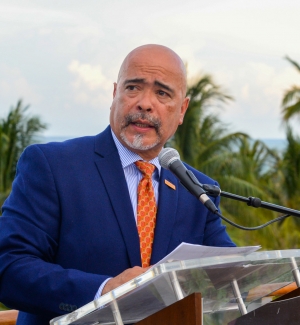The growing caravan of migrants making their way to Mexico City (and hopefully, the Mexico–U.S. border) portrays the open defiance of immigrants who have nothing left to lose but their lives. It is now about 4,000 people who are marching against the transnational immigration policies that have led to decades of violence, displacement, organized crime and de facto death sentences.
The march is also surfacing the tenuous relationship between the U.S. and Mexico that only promises to get more strained under the incoming administration of Andres Manuel López Obrador. The border relationship has usually been defined by Mexico’s complicity as the south-of-the-border actor in the U.S. deportation regime, which has only enhanced its reputation for targeted state violence against migrants. This newest caravan, following the previous traditions of annual pilgrimages, is both an assertion of the human right to migrate but also a rebuke of Mexico’s militarized response to a humanitarian crisis in Central America.
The militarization of the border is the result of the exportation of U.S. immigration policy from Mexico’s northern border to its southern, financed by the U.S. and exploited by government and organized crime pacts. While Trump’s plan of building a wall along Mexico’s northern border has been met with incredulity and attacks for being anti-immigrant, there has been little to no attention to the actual barriers imposed via the U.S.-financed border to the south.
Mexico has accepted hundreds of millions of dollars from the U.S. to enforce Plan Frontera Sur, a law enforcement plan to interdict and summarily deport migrants fleeing violence from Guatemala, Honduras and El Salvador. As I witnessed along with colleagues from the National Lawyers Guild during a delegation to Tenosique, Mexico, in 2016, the operation in practice has meant the wholly inhumane conspiracy between all levels of Mexican law enforcement (local police, immigration officials, border patrol) with various organized crime machines to brutalize, torture, rape, traffic and disappear migrants trying to reach shelters like that of La 72 Refugio.
While it seems like Mexico is allowing the current caravan to pass through, they’d rather let the thousands of migrants go and seek asylum elsewhere. Yet Mexico has an obligation under the long-standing international prohibition against refoulement of refugees to process credible claims of political persecution for asylum instead of doing the United States’ bidding.
Why aren’t we discussing the violence these migrant are fleeing instead of the fictional narrative of violence that is used to label their most nonviolent act? Because the criminalization of immigrants is a poisonous narrative being used by the Trump and Peña Nieto administrations to develop policies that target, terrorize, abuse and disappear immigrants who come to their borders seeking justice for historic wrongs.
The true criminal activity that migrants are fleeing and face on the long march to freedom, wherever it may lie for them, is rife with state-sanctioned and sponsored violence. They are subjected to being kidnapped, robbed, raped or even killed for their organs. Yet by calling them criminals, it is not only their act of walking that is criminalized (an act that Jesus himself and others have walked before as refugees) but their very presence. It is that presence that continues to wear the label of “criminal” under Jeff Sessions’ Justice Department. No longer are we actually concerned with those who have been convicted for crimes: now it is merely enough to have crossed a border while your request to file an asylum application was denied in order to be labeled a criminal and get deported.
And lest we forget, the violence and poverty in Central America that thousands of “criminals” are fleeing is the direct result of U.S. intervention in the region. The U.S. helped create the unstable nation-states by orchestrating coups, propping up military regimes and overall dismantling progressive governments that were democratically elected.
Even Mike Pompeo, as CIA director, admitted it as recently as last year. The U.S. has destabilized nations and their institutions, fomented civil wars and violence that continue to this day, imposed the “war on drugs,” arming militaries to target campesinos and indigenous people. The result? Complete displacement of entire communities and promotion of U.S. multinationals’ economic interests.
As part of an administration’s policies to eradicate “unwanteds” from a society that is increasingly attempting to assert its whiteness and maleness, we want to punish them further when they are forced to flee what we helped to create, traveling thousands of miles by foot to arrive at our border seeking not charity, but justice.
We have a legal obligation under international law to receive and process legitimate claims for asylum, and a moral obligation to remedy decades of nation-destroying. And that obligation only begins at the border. Real justice and reparations would require a critical look at U.S. foreign policy that hasn’t changed much since theMonroe Doctrine.
Migrants should not have to be forced to migrate. While migration is a human right, the choice to remain in your land is also one.
The economic and political violence wielded against millions of people in the region has long been financed, orchestrated and implemented with U.S. assistance. It’s time that countries begin to hear Trump’s nationalist cry for what it is: an honest call-out of U.S. paternalistic interests, at all costs.
It’s time they stopped being complicit.

